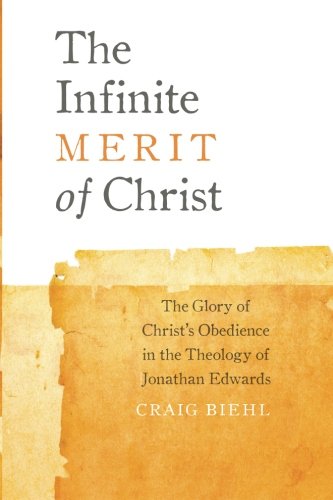Reviewed by Jeffrey C. Waddington
Introduction
Craig Biehl’s Infinite Merit of Christ is a delight to read and leads one to praise the Triune God of Scripture. With the plethora of books about various facets of the life and theology of Jonathan Edwards, you might wonder why another? My answer is straightforward. Biehl’s study is faithful to Edwards and accurate in its description of Edwards’ concern for the glory of Christ’s obedience to the Father’s unchanging rule of righteousness.
Biehl does not dwell on interaction with the seemingly infinite secondary literature, although that is in his peripheral vision. Rather, Infinite Merit is taken up with expositing the contours, colors, and exquisite details of Edwards’ theology of justification. I had the privilege of reading this book as its author was composing it for his PhD dissertation at Westminster Theological Seminary in Philadelphia several years ago. Then and now this study has the unique character of leading its readers not only to a greater understanding of Edwards on Christ’s obedience to the Law, but also leading one to the throne of grace where one will worship, enjoy, and glorify the God who has planned, executed, and applied such a stupendous redemption.
Summary
Infinite Merit is comprised of a thorough introduction, five chapters, and a conclusion which unpacks Edwards’ thinking on the beauty of the person and work of Jesus Christ. Edwards understood Christ’s work within God’s overall design to communicate his glory to intelligent creatures within his creation (25-54). In other words, Christ himself communicates in the most perfectly possible way, God’s glory through his obedience to God’s unchanging rule of righteousness. Biehl shows how Edwards delineated Christ’s person and work as the external execution of the Triune God’s pre-temporal covenant of redemption (55-85). The fall and the need for redemption were not a surprise to God and the Son voluntarily chose to become our Redeemer in obedience to the Father before all time and then in time.
In the actual procurement of redemption Christ absolutely satisfied God’s unchanging rule of righteousness (87-102). When God created Adam he required of him perfect, personal, and perpetual obedience (103-156). This was not abrogated when Adam broke the covenant of works (which Edwards clearly affirms). God’s high ethical standard is maintained and so we find that only Christ was able to meet and exceed God’s righteous expectation (157-248). It is significant that this point be understood as many have thought that after Adam’s fall God relaxed his rule of righteousness and that Christ simply made our feeble attempts at obedience acceptable to the Father for our justification.
Jonathan Edwards was nothing if not a loyal disciple of Christ and a brilliant (though fallible and sinful) pastor-theologian. He understood that Christ exhibited divergent excellencies as he fulfilled his mission from the Father. To put it simply: Jesus Christ is incomparably excellent and he offers a glimpse into the beauty that is characteristic of the triune God. Christ offered humble obedience to the Father for his people. Christ exhibits divine glory in his person and work in both his humiliation which culminated in the cross and his exaltation inaugurated at the empty tomb. Christ communicates divine glory to those with eyes to see it. I have offered only a very thin slice of the gourmet study which Biehl has given us.
Evaluation
I want to offer a few observations about the significance of Infinite Merit. Biehl demonstrates or makes manifest Edwards’ commitment to Scripture. Edwards bled bible. I am always amazed by the meticulous observations Edwards makes about various biblical texts, and Biehl has allowed this quality of Edwards to shine through in this volume. This book also shows that Edwards was a Reformed covenant theologian of no mean ability. Going back to the time of Perry Miller, many scholars have doubted that Edwards was a covenant theologian and they have contributed to the so-called Calvin versus the Calvinist model of historical theology. This model is bad history and bad theology.
Biehl also demonstrates conclusively to my mind that Edwards did not compromise the Reformed (and therefore, in my opinion, biblical) doctrine of justification. Readers may be aware that the contemporary debate about Edwards and justification has been ongoing since the 1950s and there is a broad range of opinion (to which I myself have contributed elsewhere) on whether Edwards was really a Roman Catholic unawares or an incipient inclusivist or some such thing. Infinite Merit sets the record straight on Jonathan Edwards and justification. Edwards was fully biblical (i.e., Pauline) and thoroughly Reformed.
George Marsden commented in his magnum opus Jonathan Edwards: A Life (Yale, 2003) that scholars are frequently tempted to make Edwards over in their own image. Biehl does not do this. In fact, it is one of the only secondary studies that has so many citations directly from Edwards that are also sensitive to their original context. Parenthetically, I would add that this book is a necessary resource for correcting what I perceive to be the errors found in the works of scholars holding to either the New Perspectives on Paul or the Federal Vision. Finally, and most importantly, Biehl allows Jonathan Edwards to lead us to worship our Triune God: Father, Son, and Holy Spirit, in the beauty of his holiness.
Jeffrey C. Waddington serves as stated supply at Knox Orthodox Presbyterian Church in Lansdowne, PA.
